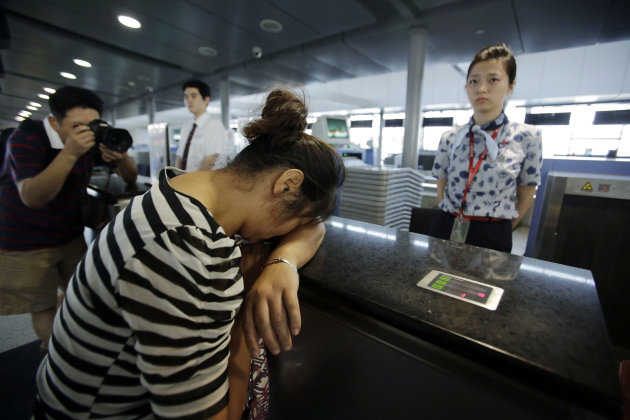LOS ANGELES (AP) -- Federal transportation officials are investigating whether Asiana Airlines failed to meet legal obligations to help the families of passengers whose flight crash landed at San Francisco International Airport.
Under U.S. law, Asiana was required to provide a range of services to family members of the 291 passengers. Among them: the prompt posting of a toll-free number to gather and distribute information, and providing transportation and lodging so family members could comfort injured loved ones.
Congress created the rules in the late 1990s following crashes after which airlines were roundly criticized for ignoring family members.
The Asiana investigation is the first into an airline's "family assistance" response of 10 major accidents covered by the rules, the U.S. Department of Transportation said. Three people died and dozens were injured when Asiana Flight 214 clipped a seawall following a trip from South Korea, where the airline is based.
Asiana's family assistance plan was last updated in 2004. The Department of Transportation audits just a few of these plans each year to check whether an airline can deliver the assurances it makes on paper. An Associated Press review of plans filed by two dozen other foreign airlines found cases in which carriers had not updated their documents as required.
After the July 6 crash, problems with Asiana's response were almost immediately apparent.
Staff with the National Transportation Safety Board, which helps coordinate family assistance after major crashes, quickly raised concerns with their Department of Transportation counterparts and presented additional evidence of problems about three weeks later, said Paul Sledzik, director of the board's Transportation Disaster Assistance Division. Citing the ongoing investigation, both the DOT and Sledzik declined to detail specifics.
Asiana spokeswoman Lee Hyomin declined to discuss the airline's family assistance plan. She said Asiana publicized toll-free numbers in the U.S., Korea and China, where many passengers came from; used emails and phone calls to communicate with the families of passengers; and flew family members to San Francisco if they wanted to go.
A review by the AP of Asiana's family assistance plan showed the airline did not meet several important assurances, including that it would keep its emergency contact information current and post a public information number within an hour.
The first record AP found of a publicly circulated number was just over three hours after the crash, but that was to an automated Asiana reservations line. The following day, the airline posted a different number, which it then changed several days later.
"Imagine the panic of a family member who realizes their loved one was on Asiana calling each hospital, calling the airport, calling anyone they can," said Robert A. Jensen, CEO of Kenyon International Emergency Services, which has contracts with hundreds of airlines to help after a crash.
The day after the accident, the NTSB called Jensen to ask if Kenyon was assisting the airline. The answer was no; Asiana had dropped the firm in 2008 and apparently did not sign up a substitute.
Department of Transportation spokesman Bill Mosley said that two hours after the crash, the agency contacted Asiana's attorney, "reminding the carrier of its family assistance obligations, and in particular of the need for the required telephone line."
The airline's plan also promised the NTSB a list of emergency contact names and numbers for "key management officials." The safety board said that information in Asiana's plan was not current, and that the airline had ignored a request in June 2012 for an update.
Attorney Michael Verna represents passengers and family members who are suing the South Korean airline.
One client, Hector Machorro, was waiting at the airport for the arrival of his wife and young son. After the crash, he was taken to an airport lounge where he waited "for hours not getting any information," Verna said, despite the requirement that airlines provide families with timely updates on passengers.
Machorro finally got word from his wife, who called his cellphone from San Francisco General Hospital, where she and their 8-year-old son were being treated for bruising. It wasn't until several days later that Asiana called Machorro, according to Verna, and then the airline's representative asked only about his son.
In looking at Asiana's performance, the AP reviewed the plans of other foreign airlines and found instances of outdated information, as well as the failure to file required updates.
For example, Malaysia Airlines last updated its plan in 2000 and did not file a required addendum in 2004, after Congress revised the family assistance law.
When AP pointed out the lack of an updated plan, the Department of Transportation gave Malaysia Airlines 21 days to refile, and agency spokesman Mosley said Tuesday that the airline had done so. The airline declined to comment.
Many of the plans were just a few pages long and contained not much beyond a list of assurances that the U.S. government has little way of knowing whether an airline can keep.
A few airlines view filing the documents as a box to check if they want to fly in the United States and don't prepare for what to do should a plane crash, according to several aviation disaster consultants.
"We do have some foreign and domestic carriers that only want to submit a plan and then do no additional consultation with us on their planning and preparedness," said Vivian Marinelli, senior director of crisis management services at FEI Behavioral Health, a firm which helps airlines devise family response plans. "It is only after an accident that they realize how critical this really is."
Airlines face up to a $27,500 penalty for each family assistance law violation.
"Our oversight, as well as the potential fines, provide a strong incentive for compliance," according to DOT spokesman Mosley.
 Carey Lowell and Richard Gere (Steve Granitz/WireImage)Richard Gere is down another pretty woman: the star and Carey Lowell have called it quits.
Carey Lowell and Richard Gere (Steve Granitz/WireImage)Richard Gere is down another pretty woman: the star and Carey Lowell have called it quits.







